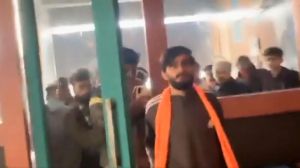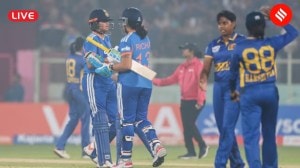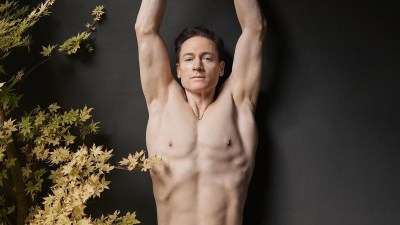PM Modi’s US visit: from attending Quad Summit to diaspora event, key takeaways from his 3-day tour
Here are the highlights from Prime Minister Narendra Modi’s ‘successful and substantial’ tour of the United States.
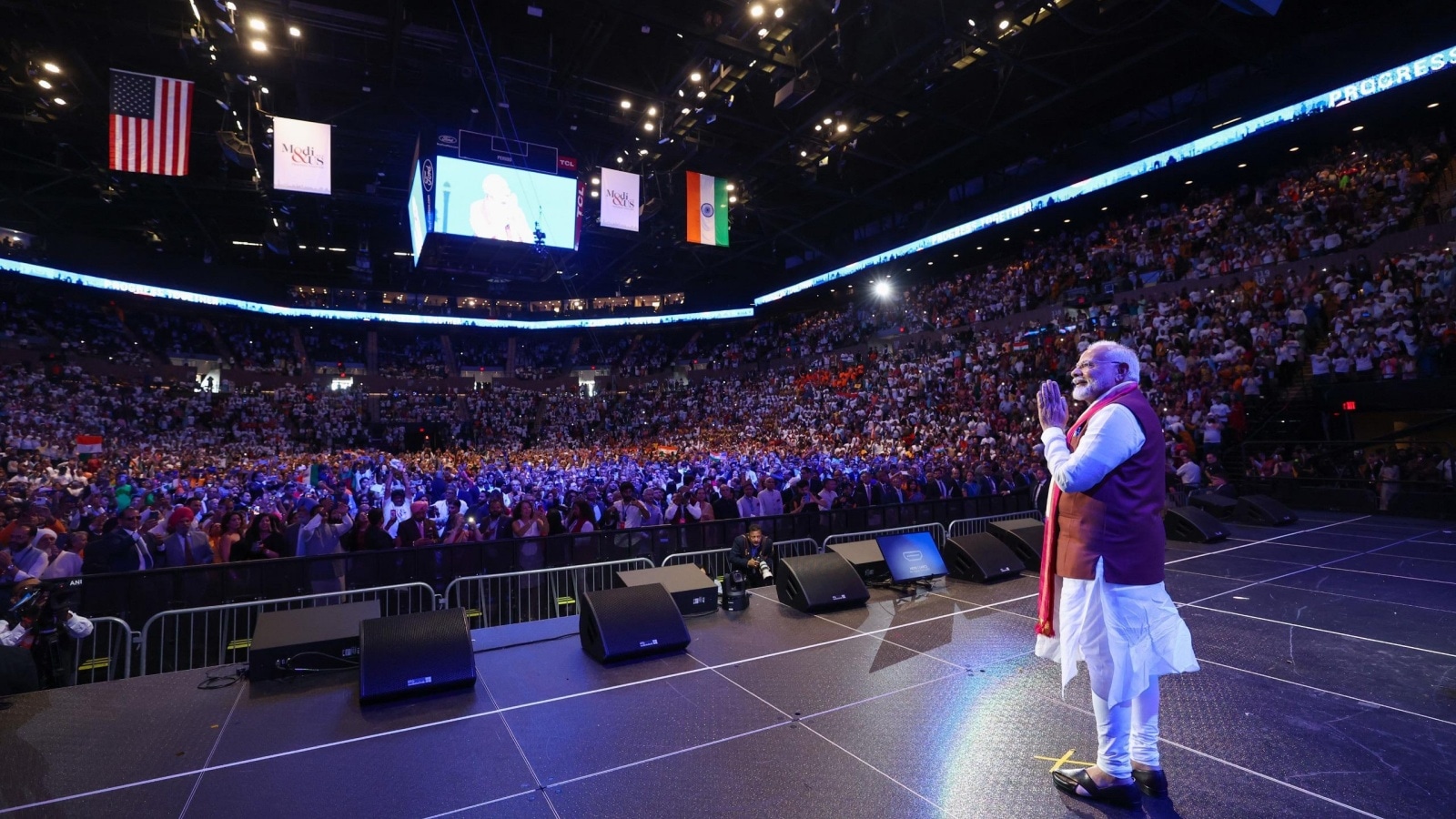 Prime Minister Narendra Modi attends a gathering of the Indo-American Community of USA (IACU) in New York City, U.S. September 22, 2024. (Photo: X/@narendramodi)
Prime Minister Narendra Modi attends a gathering of the Indo-American Community of USA (IACU) in New York City, U.S. September 22, 2024. (Photo: X/@narendramodi)After concluding his three-day visit to the United States, Prime Minister Narendra Modi left for home on Monday, the Ministry of External Affairs said.
“PM @narendramodi emplanes for New Delhi after concluding a successful and substantial visit to the USA,” the ministry wrote on X.
During his trip, he attended the Quad Leaders’ Summit in Wilmington on September 21, addressed thousands of members of the Indian American community in Long Island on September 22, and spoke at the UN’s Summit of the Future on Monday.
The prime minister engaged in bilateral discussions with world leaders and held a roundtable with CEOs from leading American tech companies.
Here are the highlights from his US tour:
Day 1: The Quad Summit
On Day 1 of his US visit, Prime Minister Modi attended the Quad Summit hosted by President Joe Biden in Wilmington, Delaware. The summit was also attended by Australian Prime Minister Anthony Albanese and Japanese Prime Minister Fumio Kishida.
Modi noted that the Quad leaders gathered during a time of global tensions, emphasising that their collaboration is important for all of humanity.
Highlighting that they are “not against anyone” he said that they support a rules-based international order, respect for sovereignty, and the peaceful resolution of disputes. This was seen as a subtle reference to China’s assertive actions in the Indo-Pacific region.
President Biden was caught expressing concern about China on hot mic, saying that it is “testing” the Quad while trying to “buy diplomatic space”. The final declaration of Quad included stronger language regarding the South China Sea than in previous versions.
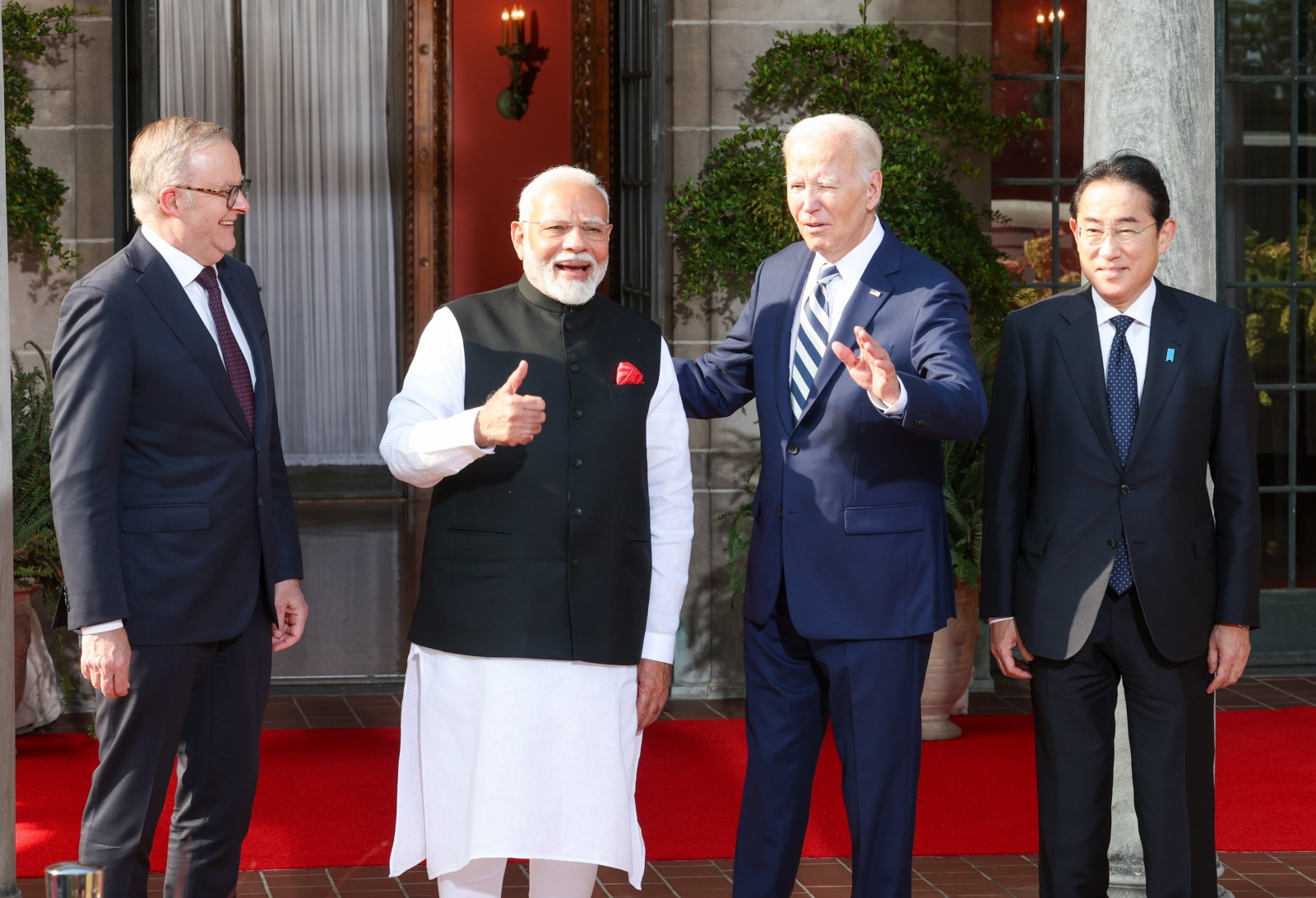 PM Modi attended the Quad Summit hosted by President Joe Biden at Wilmington, Delaware. The summit also included Australian Prime Minister Anthony Albanese and Japanese Prime Minister Fumio Kishida. (Photo: X/@narendramodi)
PM Modi attended the Quad Summit hosted by President Joe Biden at Wilmington, Delaware. The summit also included Australian Prime Minister Anthony Albanese and Japanese Prime Minister Fumio Kishida. (Photo: X/@narendramodi)
The summit featured a bilateral meeting between Modi and Biden, who remarked that the partnership between the United States and India is “stronger, closer, and more dynamic than ever”.
Both the leaders hailed a significant agreement to establish a new semiconductor fabrication plant in India, supported by the India Semiconductor Mission and a strategic partnership involving Bharat Semi, 3rdiTech, and the US Space Force.
The Quad leaders also announced the Quad Cancer Moonshot, a partnership aimed at initially combating cervical cancer in the Indo-Pacific, with plans to address other types of cancer in the future.
Modi and Albanese committed themselves to strengthening bilateral ties, with the Indian prime minister expressing his appreciation for the enduring friendship between his country and Australia. In a post on X, Modi described his meeting with Japanese Prime Minister Kishida as “very good”, focusing on cooperation in infrastructure, semiconductors, defence, and green energy.
Additionally, the US handed over 297 antiquities, smuggled out of India, to Modi during his visit, as confirmed by Foreign Secretary Vikram Misri. He also noted that issues related to Bangladesh were discussed in the meeting between Modi and Biden.
Day 2: ‘Modi & US’ mega community event
PM Modi addressed a gathering of over 13,000 Indian Americans, with many attendees hailing from the New York and New Jersey area, while others travelled from 40 states across the country. Organisers reported that sixty chartered buses were used for transportation.
Describing India as a “land of opportunities”, Modi shared his ambitious goals for the nation during his third term.
Modi also announced the opening of two new consulates in Boston and Los Angeles, addressing a long-standing demand from the rapidly growing Indian American community in these major cities.
 Modi addressed a gathering of over 13,000 Indian-Americans at the Nassau Coliseum stadium in Long Island. (Photo: X/@narendramodi)
Modi addressed a gathering of over 13,000 Indian-Americans at the Nassau Coliseum stadium in Long Island. (Photo: X/@narendramodi)
“Every Indian has confidence in India and its achievements. India today is a land of opportunities. It’s no longer waiting for opportunities. It is now creating opportunities,” he said, adding that in just a decade 250 million people have been lifted out of poverty.
The prime minister emphasised India’s foreign policy of fostering equal closeness with all nations, rather than maintaining equal distance.
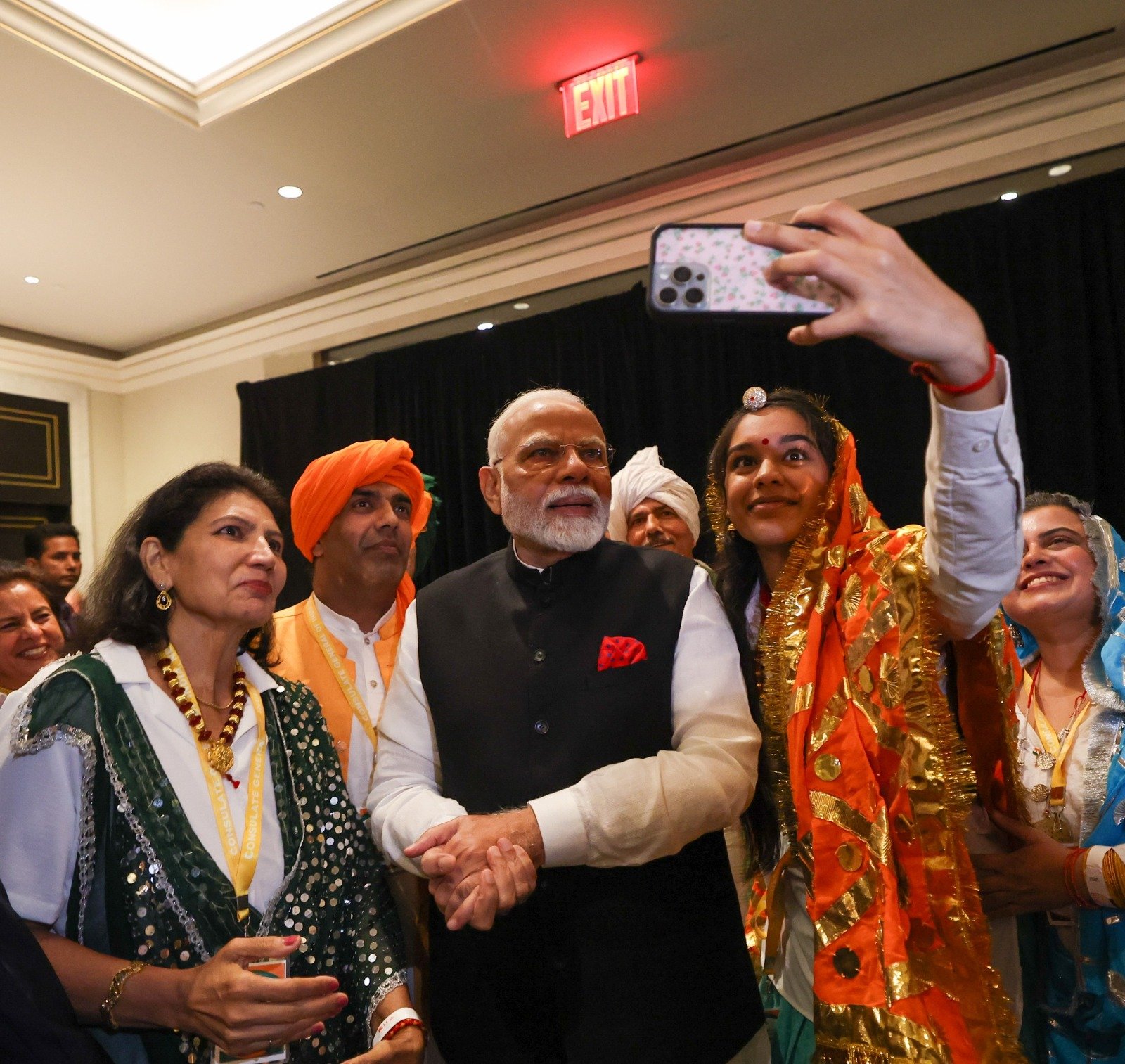 PM Modi with the Indian diaspora community in Lon Island. (Photo: X/@narendramodi)
PM Modi with the Indian diaspora community in Lon Island. (Photo: X/@narendramodi)
Recognising the vital role of Indian Americans in strengthening ties between India and the United States, he referred to them as India’s brand ambassadors.
Day 3: UN Summit of the Future
On the last day of his US visit, Prime Minister Modi addressed the UN’s Summit of the Future in New York. He began his speech with a namaskar, emphasising that he represents the voice of 1.4 billion Indians, or one-sixth of humanity.
“Success of humanity lies in our collective strength, not on the battlefield,” Modi stated, highlighting the urgent need for global cooperation amid ongoing conflicts like those in Israel-Gaza and Ukraine.
Modi stressed that reform is essential for the relevance of global institutions and pointed out that the inclusion of the African Union as a permanent G20 member during India’s presidency was a significant step in this direction.
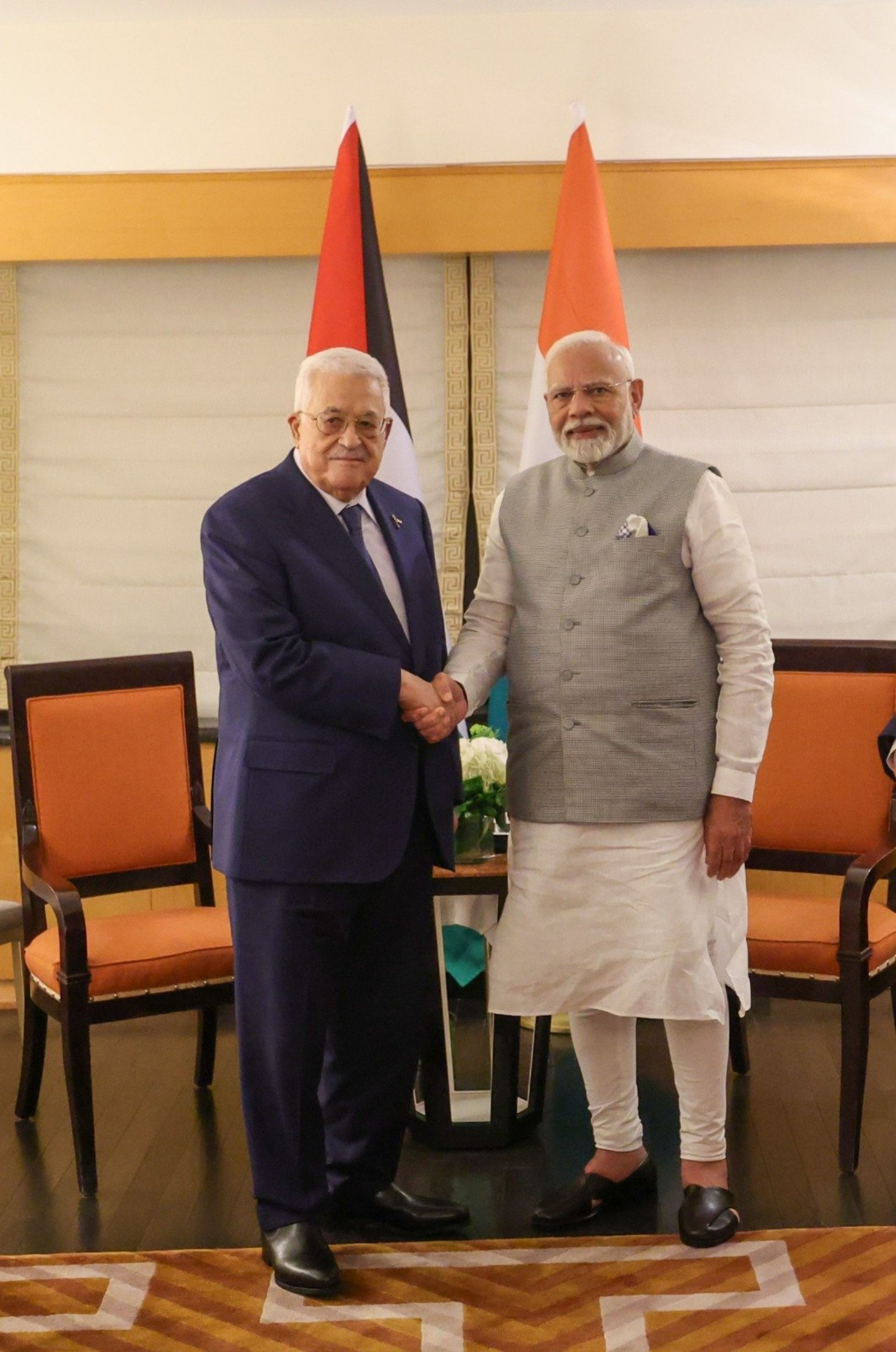 PM Modi meets Palestinian President Mahmoud Abbas. (Photo: X/@narendramodi)
PM Modi meets Palestinian President Mahmoud Abbas. (Photo: X/@narendramodi)
Modi acknowledged that terrorism remains a serious threat to global peace and security, and he noted that new areas of conflict are emerging, such as in cyberspace, maritime zones, and outer space.
During his visit, Modi met Palestinian President Mahmoud Abbas and expressed his “deep concern” about the humanitarian situation in Gaza and reaffirmed India’s support for restoring peace and stability in the region.
He also spoke with Ukrainian President Volodymyr Zelenskyy, reiterating India’s commitment to an early resolution of the conflict with Russia and the restoration of peace. This marked their third meeting in about three months; they last met in Kyiv on August 23.
 PM Modi with Ukrainian President Volodymyr Zelensky. (Photo: X/@narendramodi)
PM Modi with Ukrainian President Volodymyr Zelensky. (Photo: X/@narendramodi)
Modi emphasised “India’s clear, consistent and constructive approach in favour of a peaceful resolution of the conflict through diplomacy and dialogue”.
Additionally, he held discussions with Armenian Prime Minister Nikol Pashinyan and met Vietnamese President To Lam to enhance ties between India and Vietnam in areas like connectivity, trade, and culture.
Modi also engaged with members of the Sikh community in New York. Prominent Sikh leader Darshan Singh Dhaliwal said, “We had a very good discussion. The prime minister has done a lot for the Sikh community.”
 PM Modi with Armenian Prime Minister Nikol Pashinyan. (Photo: X/@narendramodi)
PM Modi with Armenian Prime Minister Nikol Pashinyan. (Photo: X/@narendramodi)
In his meetings, Modi also met Sheikh Sabah Khaled Al-Hamad Al-Sabah, the Crown Prince of Kuwait, and they discussed boosting bilateral ties in sectors such as pharmaceuticals, food processing, technology, and energy.
He also spoke to Nepal Prime Minister K P Oli about energy, technology, and trade issues.
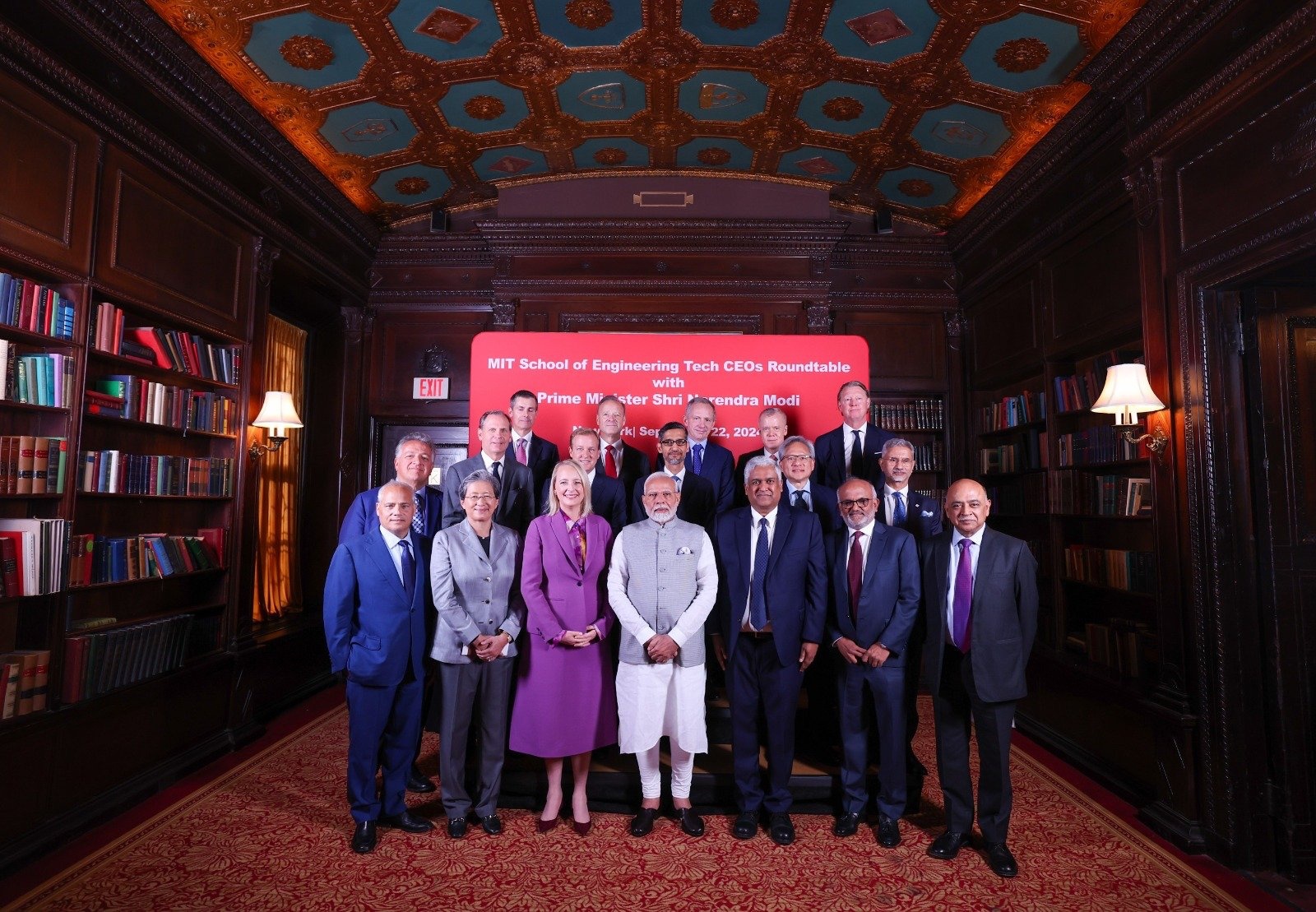 Prime Minister Narendra Modi during a roundtable meeting with MIT School of Engineering Tech CEOs, in New York. (Photo: X/@narendramodi)
Prime Minister Narendra Modi during a roundtable meeting with MIT School of Engineering Tech CEOs, in New York. (Photo: X/@narendramodi)
Lastly, Modi held a roundtable with technology industry leaders, including Google CEO Sundar Pichai. He encouraged them to capitalise on India’s growth story for collaboration and innovation, discussing cutting-edge fields like artificial intelligence, quantum computing, biotechnology, IT, and semiconductor technologies.


